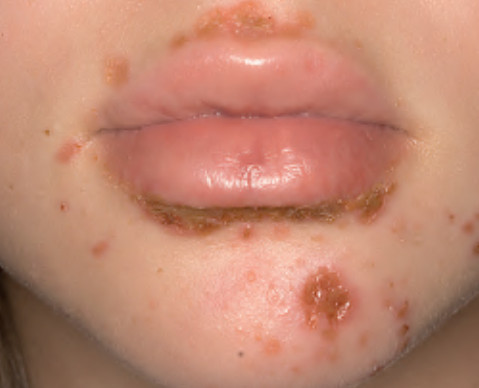Impetigo treatment options
Instructions
- Cleansing the affected area and removing crusts by wet dressings.
- Chlorhexidine and povidone–iodine antiseptics may be used.

Medical treatment options
- For limited, localized infections of non bullous impetigo due to S. aureus or S.pyogenes
- Mupirocin 2% ointment or cream : three times a day for 10 days.
- Retapamulin ointment : two times a day for 5 days.
- Fusidic acid.
- For widespread infections, especially bullous impetigo
- Dicloxacillin : 250 mg 4 times per day for adults.
- Dicloxacillin :12 mg/kg/day in 4 divided doses PO for children.
- Cephalexin : 250 mg 4 times per day PO for adults.
- Cephalexin : 25 mg/kg/day in 4 divided doses PO for children.
- Amoxicillin/clavulanate : 875/125 mg 2 times per day PO for adults
- Amoxicillin/clavulanate : 25 mg/kg/day of amoxicillin component in 2 divided doses PO for children.
- Erythromycin : 250 mg 4 times per day PO for adults.
- Erythromycin :40 mg/kg/day in 4 divided doses PO for children.
- For penicillin-allergic patients
- Azithromycin given over 5 days (500 mg on day 1 and 250 mg on days 2–5.
- Clarithromycin: 250 to 500 mg twice daily for 10 days may be effective.
- For Recurrent disease
- Mupirocin 2% ointment to nares twice a day for 5 days to be repeated monthly for several months.
- Bleaching baths (soak for 5 to 10 minutes two or three times per week in diluted bleach (14 cup regular bleach in a half tub of water).
References
Griffiths, C., Barker, J., Bleiker, T. O., Chalmers, R., & Creamer, D. (Eds.). (2016). Rook’s textbook of dermatology. John Wiley & Sons.
Dermatology , Edited by Jean L. Bolognia , Julie V. Schaffer , Lorenzo Cerroni Fourth edition: Elsevier, 2018, ISBN 978–0‐7020–6275–9